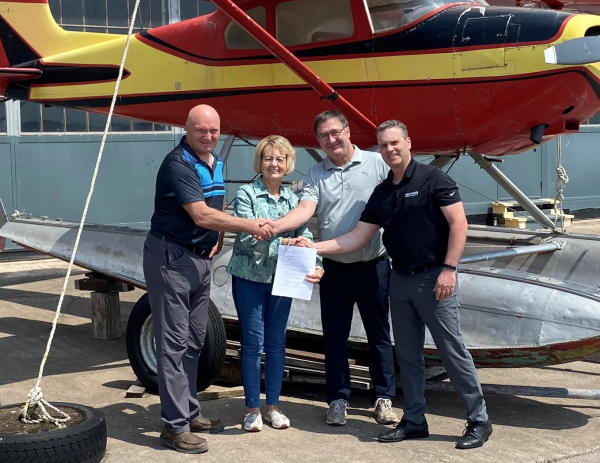
Signing at the Canadian Bushplane Heritage Centre, Sault Ste. Marie, ON. Left to right: Gerard Morry, (Hornepayne Lumber), Betty McGie and Sean Coe (Remote-Based Tourism Outfitter), and Dan Bowes (Columbia Forest Products).
Float planes were still grounded as ice persisted on the fly-in remote lakes, but the hand shakes were warm and genuine. Hornepayne Lumber, Columbia Forest Products and Pine Portage Lodge (a Resource-Based Tourism Operator) have signed a Resource Stewardship Agreement (RSA) for the forest surrounding Hornepayne, Ontario. This is indeed a milestone, as it is the first RSA to be signed during the implementation of the Nagagami 2021-2031 Forest Management Plan (FMP). “This RSA is about two resource- based industries working together for mutual benefit”, states Dan Bowes, Ontario Woodlands and Fibre Resources Manager at Columbia Forest Products, as he recognizes this will be used as an example for other potential agreements amongst the remaining twenty plus outfitters in the area.
This RSA is built from the principles as outlined in the Tourism and Forestry Industry Memorandum of Understanding (MOU) between the local forest industry (Hornepayne Lumber and Columbia Forest Products) and the Algoma Wilderness Tourist Outfitter’s Association.
The parties have been working together and will continue to work together in developing prescriptions that will maintain a similar level of remoteness that existed prior to forest management operations. One of the main objectives is to ensure that over the long term there is continued access to timber resources close to tourism values provided that the value can be protected through the appropriate forest management prescriptions and access management provisions. Area of Concern (AOC) prescriptions and road use management strategies found within the Nagagami 2021-2031 FMP, as well as other overriding Land Use Decisions such as those documented in the Crown Land Policy Atlas (CLUPA) and the Crown Land Use Harmonization project (CLUAH) protect the resource-based tourism values. The RSA is another step to continue this dialog by working with each individual outfitter to develop site specific strategies to maintain the perception of wilderness that is so very important to their business. “The perception of being in remote wilderness is extremely important for the success of our business. That’s what our clients are looking for and why they keep coming back. Viewscapes from the lake are what gives our clientele the remote wilderness experience, as well as the sustainability of the natural resources – fish/wildlife- on which we depend. The forest industry is a key industry partner in Northern Ontario, and we also want to make sure that they are sustainable and viable into the future” says Betty McGie, a renowned and long-standing operator on Lake Kabinakagami (AKA Kaby Lake).
Forest Industry recognizes that Ontario is a world class wilderness tourism destination, likewise the Resource-Based Tourism Industry recognizes the necessity for forest industry sustainability.
- SSM RotaryFest Take Your Pick Draw is back - July 4, 2025
- Thank You – M.H.S. Graduation 2025 - July 2, 2025
- Men’s NIght Golf – June 26 - July 1, 2025
 Wawa-news.com You can't hear the 'big picture'!
Wawa-news.com You can't hear the 'big picture'!
